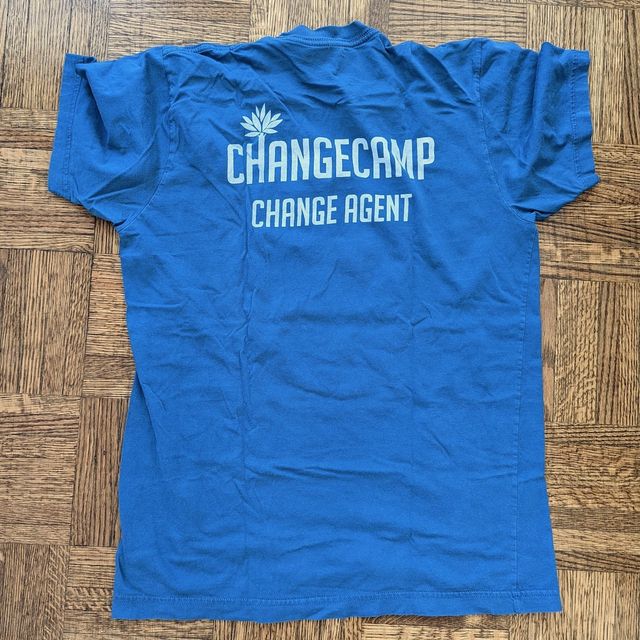The Age of Participation


Recently I was clearing out some old stuff that no longer sparked joy™ and decided the time had come for this T-shirt. Instead of thanking the shirt, however, I thought it was more meaningful to eulogize the era for which it’s personally emblematic.
I got it in exchange for being a volunteer facilitator — a “change agent” — at ChangeCampTO in 2010. ChangeCamp was an “unconference” — a term that dates it to an extremely specific moment in our shared socio-digital fossil record. Here’s how the organizers described it:
ChangeCamp is an event format, an open community and a set of tools and ideas designed to give citizens and governments the ability to work collaboratively in new ways to make change and to better address real-world challenges in our communities.
The event itself was held at the Metro Toronto Reference Library on February 16, 2010. Since it was an unconference, there was no firm agenda beyond a “design exercise” in which participants, in groups of 8, considered questions like “How do we re-imagine government and citizenship in the age of participation?” As facilitator for one group, my job was to try to keep my table’s conversation on track, as well as documenting it in real-time through a live-blog format (We used ScribbleLive). I don’t remember any specifics of that conversation today, but I remember the vibe with perfect clarity.
These ideas were everywhere in the late ’00s and early ’10s. I’d summarize the ethos this way:
- The Internet is, broadly speaking, a democratizing force;
- Open Source, which contributed so much to the creation of the Internet, is a viable model for broader sectors of society;
- Transparency and openness naturally foster more humane governance;
- Innovation and efficiency are core virtues of governments and other public institutions;
- When more people are involved in a process, it will naturally be more representative.
Today, every one of these ideas has been shown to be outright wrong at worst, or, at best, hopelessly naïve. But at the time, they were inescapable. And for the “citizens, policy-makers, technologists, design-thinkers, change agents and media creators” (lol) who were the ChangeCamp constituency, they felt like a genuine, widespread, and necessary evolution in our social and civic life.
You can observe strands of this ideology popping up everywhere around this time:
- The Arab Spring (2010)
- Occupy Wall Street (2011)
- “Crowdfunding” services like IndieGoGo (founded 2008) and Kickstarter (2009)
- “Sharing economy” (lol) companies like Airbnb (2008) and Uber (2009)
- Massive Open Online Courses (MOOCs, peaking around 2012)
- Archive of Our Own (2008), the repository of
fan-fiction“transformative works” - “Collaborative mapping” services like Ushahidi (2008) and its precursor OpenStreetMap (2004)
- Open Parliament (2010)
- Cryptocurrency (Bitcoin, first minted 2009) also has its roots here
In very real ways, we’re today living through the “Age of Participation” envisioned by ChangeCamp and all its fellow travellers. I’d say this age is considerably darker than we envisioned, sitting around those tables at the library one February evening in 2010. But it’s still nice to remember the optimism of that moment, and how excited we were about Change. We probably should have been more specific.